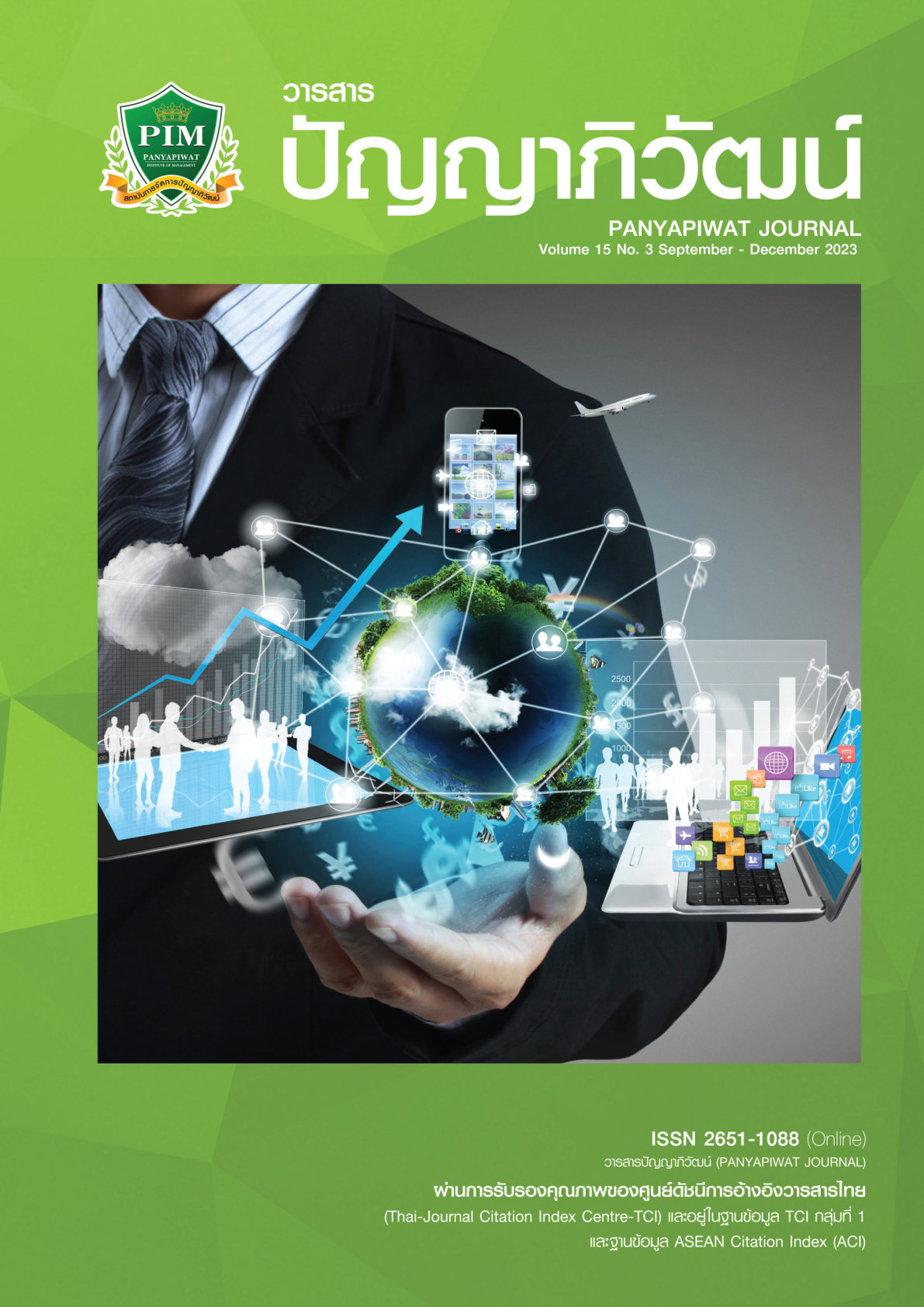การจำแนกประเภทคุณลักษณะคุณภาพของการให้บริการด้านเทคโนโลยีสารสนเทศ ในช่วงโรคระบาดไวรัสโคโรนา (COVID-19) โดยการประยุกต์แบบจำลองคาโนเชิงวิเคราะห์กรณีศึกษา คณะวิทยาศาสตร์และเทคโนโลยี สังกัดสถาบันอุดมศึกษาในกำกับของรัฐแห่งหนึ่ง
Main Article Content
บทคัดย่อ
การวิจัยเรื่องนี้มีวัตถุประสงค์เพื่อวิเคราะห์ความพึงพอใจของผู้ใช้บริการต่อคุณภาพการบริการด้านเทคโนโลยีสารสนเทศในช่วงโร่คระบาดไวรัสโคโรนา(COVID-19)โดยการศึกษานี้ได้ระบุคุณลักษณะการให้บริการด้านเทคโนโลยีสารสนเทศตามตัวแบบ SERVQUAL และทำการวิเคราะห์จำแนกประเภทคุณลักษณะของคุณภาพการให้บริการด้านเทคโนโลยีสารสนเทศที่มีผลต่อความพึงพอใจของผู้รับบริการ งานวิจัยนี้ใด้ใช้ คณะวิทยาศาสตร์และเทคโนโลยี สังกัดสถาบันอุดมศึกษาในกำกับของรัฐแห่งหนึ่งเป็นกรณีศึกษา การวิจัยนี้เป็นงานเชิงสำรวจ โดยเลือกกลุ่มตัวอย่างแบบเจาะจง (Purposive Sampling) จากบุคลากร (อาจารย์และพนักงานสายสนับสนุน) จำนวน 133 คน โดยใช้เครื่องมือแบบสอบถามที่ได้จากการสังเคราะห์บทความวิซาการ เอกสารงานวิจัยที่เกี่ยวข้อง จากนั้นนำข้อมูลที่ได้จากการรวบรวมแบบสอบถาม มาทำการวิเคราะห์ข้อมูลด้วยการประยุกต์วิธีการ "แบบจำลอง A-Kano" (Analytical Kano Model) ซึ่งผลการศึกษาสามารถสรุปได้ดังนี้ 1) สามารถชี้บ่งคุณลักษณะของการ ให้บริการด้านเทคโนโลยีสารสนเทศตามตัวแบบ SERVQUAL ได้ทั้งหมด 15 คุณลักษณะ 2) จากการวิเคราะห์ ข้อมูลด้วย "แบบจำลอง A-Kano" พบว่า มี 5 คุณลักษณะ จัดอยู่ในประเภทคุณลักษณะที่ "สามารถดึงดูด ผู้รับบริการ" (Attractive Characteristics) และอีก 10 คุณลักษณะ จัดอยู่ในประเภท "คุณลักษณะแบบเฉย ๆ" (Indifferent Characteristics) โดยประโยชน์ของงานวิจัยนี้ให้ประโยชน์ทั้งเชิงวิชาการ (Academic Contribution) คือ เป็นงานวิจัยแรกที่ประยุกต์ "แบบจำลอง A-Kano" ในการศึกษาจำแนกประเภทคุณลักษณะคุณภาพของการให้บริการด้านเทคโนโลยีสารสนเทศ ในช่วงโรคระบาดไวรัสโคโรนา (COVID-19) และประโยชน์เชิงการนำไปใช้ในทางปฏิบัติ (Practical Contribution) คือ ผู้บริหารของคณะกรณีศึกษา สามารถนำผลงานวิจัยนี้ไปใช้ในการปรับปรุงคุณภาพการให้บริการด้านเทคโนโลยีสารสนเทศในช่วงโรคระบาดไวรัสโคโรนา (COVID-19) รวมถึงหน่วยงานอื่นสามารถนำกรอบแนวคิดนี้ไปใช้ในบริบทที่คล้ายคลึงกันได้
Article Details

อนุญาตภายใต้เงื่อนไข Creative Commons Attribution-NonCommercial-NoDerivatives 4.0 International License.
“ข้าพเจ้าและผู้เขียนร่วม (ถ้ามี) ขอรับรองว่า บทความที่เสนอมานี้ยังไม่เคยได้รับการตีพิมพ์และไม่ได้อยู่ระหว่างกระบวนการพิจารณาลงตีพิมพ์ในวารสารหรือแหล่งเผยแพร่อื่นใด ข้าพเจ้าและผู้เขียนร่วมยอมรับหลักเกณฑ์การพิจารณาต้นฉบับ ทั้งยินยอมให้กองบรรณาธิการมีสิทธิ์พิจารณาและตรวจแก้ต้นฉบับได้ตามที่เห็นสมควร พร้อมนี้ขอมอบลิขสิทธิ์บทความที่ได้รับการตีพิมพ์ให้แก่สถาบันการจัดการปัญญาภิวัฒน์หากมีการฟ้องร้องเรื่องการละเมิดลิขสิทธิ์เกี่ยวกับภาพ กราฟ ข้อความส่วนใดส่วนหนึ่งและ/หรือข้อคิดเห็นที่ปรากฏในบทความข้าพเจ้าและผู้เขียนร่วมยินยอมรับผิดชอบแต่เพียงฝ่ายเดียว”
เอกสารอ้างอิง
Anabila, P., Anome, J., & Kumi, D. K. (2020). Assessing service quality in Ghana’s public hospitals: Evidence from Greater Accra and Ashanti Regions. Total Quality Management and Business Excellence, 31(9/10), 1-13.
Chen, Y. H., Chou, Y. L., Tsai, C. L. & Chang, H. C. (2018). Evaluating car centre service quality with modified Kano model based on the first-time buyer’s age. Cogent Business & Management, 5(1), 1-11.
Gangurde, S. R., & Patil, S. S. (2018). Benchmark product features using the Kano-QFD approach: A case study. Benchmarking: An International Journal, 25, 2, 450-470.
Hsu, S. W., Qing, F., Wang, C. C., & Hsieh, H. L. (2018). Evaluation of service quality in Facebook-based group-buying. Electronic Commerce Research and Applications, 28, 30-36.
Kano, N., Seraku, N., Takahashi, F., & Tsuji, S. (1984). Attractive quality and must-be quality. The Journal of the Japanese Society for Quality Control, 14, 39-48.
Kohli, A., & Singh, R. (2020). An assessment of customers’ satisfaction for emerging technologies in passenger cars using Kano model. Vilakshan - XIMB Journal of Management, 18(1), 76-88.
Li, H., Liu, Y., Tan, C. W., & Hu, F. (2020). Comprehending customer satisfaction with hotels: Data analysis of consumer-generated reviews. International Journal of Contemporary Hospitality Management, 32(5), 1713-1735.
Ma, M. Y., Chen, C. W., & Chang, Y. M. (2019). Using Kano model to differentiate between future vehicle-driving services. International Journal of Industrial Ergonomics, 69, 142-152.
Mejia, J., Mankad, S., & Gopal, A., (2021). Service quality using text mining: Measurement and consequences. Manufacturing & Service Operations Management, 23(6), 1354-1372.
Men, L. R., Qin, Y. S., & Jin, J. (2021). Fostering employee trust via effective supervisory communication during the COVID-19 pandemic: Through the lens of motivating language theory. International Journal of Business Communication, 59(2), 1-26.
Parasuraman, A., Zeithaml, V. A., & Malhotra, A. (2005). E-S-Qual: A multiple-Item scale for assessing electronic service quality. Journal of Service Research, 7(3), 213-233.
Park, S., Johnson, K. R., & Chaudhuri, S. (2019). Promoting work engagement in the hotel sector: Review and analysis. Management Research Review, 42(8), 971-990.
Rawat, A. (2016). Achieving customer-centricity through digital transformation. WNS Global Services.
Shokouhyar, S., Shokoohyar, S., & Safari, S. (2020). Research on the influence of after-sales service quality factors on customer satisfaction. Journal of Retailing and Consumer Services, 56, 102139.
Sireli, Y., Kauffmann, P., & Ozan, E. (2007). Integration of Kano’s model into QFD for multiple product design. IEEE Transactions on Engineering Management, 54(2), 380-390.
Suh, Y., Woo, C., Koh, J., & Jeon, J. (2019). Analyzing the satisfaction of university–industry cooperation efforts based on the Kano model: A Korean case. Technol. Forecast. Soc. Change, 148, 119740.
Sulphey, M. M., & Jasim, K. M. (2020). Ascertaining service quality and medical practitioners’ sensitivity towards surgical instruments using SERVQUAL. Benchmarking: An International Journal, 28(1), 370-405.
Tao, W., Lee, Y., Sun, R., Li, J., & He, M. (2022). Enhancing employee engagement via leaders’ motivational language in times of crisis: Perspectives from the COVID-19 outbreak. Public Relations Review, 48(1), 102133.
Xu, Q., Jiao R. J., Yang, X., Helander, M., Jiao, R. J., Khalid, H. M., & Opperud, A. (2009). An analytical Kano model for customer need analysis. Design Studies, 30(1), 87-110.
Yamane, T. (1973). Statistics: An introductory analysis (3rd ed.). Harper and Row.
Yan, C., Ni, J., Chien, Y., & Lo, C. (2021). Does workplace friendship promote or hinder hotel employees’ work engagement? The role of role ambiguity. Journal of Hospitality and Tourism Management, 46, 205-214.
Zhang, J., Lu, X., & Liu, D. (2021). Deriving customer preferences for hotels based on aspect-level sentiment analysis of online reviews. Electron. Comer. Res. Appl, 49, 101094.


